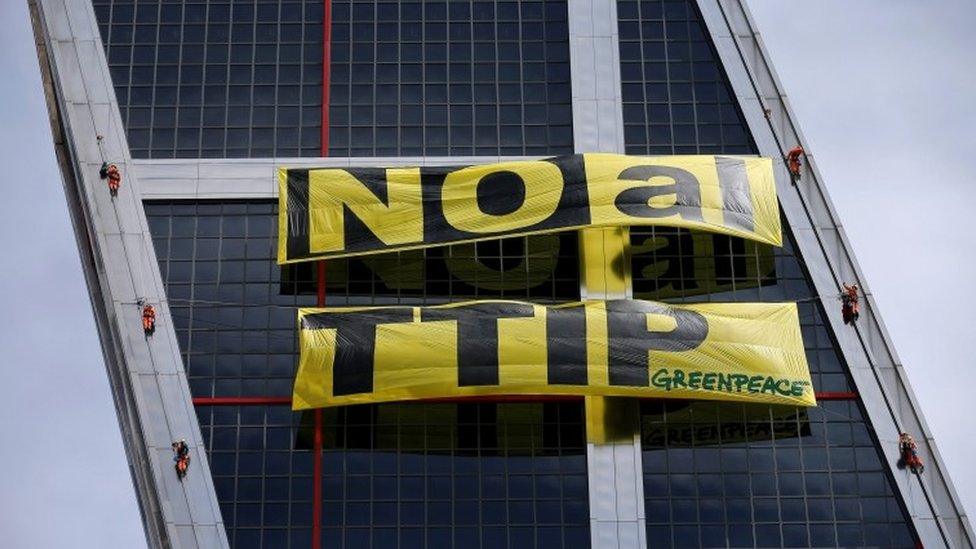Ministers facing trouble over rebel amendment
- Published
- comments

Greenpeace is one organisation opposed to the TTIP free trade agreement
Will ministers have to grit their teeth and support the rebel Queen's Speech amendment proposed today by Brexiteers?
The amendment - formally, it's to the motion thanking Her Majesty for the "Gracious Speech" - is a very smart piece of parliamentary manoeuvre. It invites MPs to "respectfully regret that a Bill to protect the National Health Service from the Transatlantic Trade and Investment Partnership, external was not included".
It will certainly attract the support of 20 plus Conservatives, plus Labour and the SNP and probably the heavily pro-Brexit Northern Ireland DUP.
It would be a remarkable volte-face for Labour not to support the amendment; their 2015 manifesto, external reads: "We support the principles behind the negotiations on the Transatlantic Trade and Investment Partnership Treaty (TTIP). We will hold the European Commission to account on issues of concern, including the impact on public services and the Investor to State Dispute Settlement Mechanism. And we will ensure the NHS is protected from the TTIP treaty."
The Brexiteer amendment, signed by Vote Leave luminaries Peter Lilley, Steve Baker and Anne-Marie Trevelyn, zeros in on those precise concerns. Would the supra-national court system envisaged in the TTIP talks over-ride British sensibilities about privatisation in the NHS, and allow US and other multi-nationals to muscle in?
It's an issue which many on the Labour side are deeply concerned about - even though the government insists such fears are baseless.
When news of the amendment broke today, the PM's official spokesman repeated the assurance that: "the Health service is completely protected under this agreement [TTIP]. That's been made very clear by the European Commissioner for Trade who has said member states do not have to open public health services to competition from private providers nor do they have to out-source services to private providers. The US negotiator has also agreed with that position and said it will not require governments to privatise any service."
What's the problem?
The trouble for ministers is that resisting the amendment might rebound on the Remain campaign...
Labour MPs and Labour supporters might start asking themselves if there really was something to worry about, and Labour support for the Remain cause might waver.
The DUP stance is the clincher here. Normally they're the government's go-to source for reinforcements when their majority is threatened, but as a party they're pro-Leave, so they will support this amendment.
Then there's the point that no government has lost a vote on a Queen's Speech since Stanley Baldwin's, 90 years ago. Even the prospect of a big backbench rebellion was enough to force the government to accept the principle of an EU Referendum, when an amendment was put down to the 2012 Queen's Speech.
A defeat this year might not bring this government down, but it would be highly embarrassing.
So however much they might seethe in private, it may be that the smart move, both in terms of referendum politics and of Commons numbers, is for ministers is to accept the amendment, minimise the fuss - and console themselves with thoughts of revenge after 23 June.
NB: It's worth adding that the 2012 Queen's Speech amendment provides an important precedent here - because the Speaker, John Bercow, was prepared to stretch standing orders to allow a backbench amendment to be discussed - much to the fury of government business managers at the time. The actual selection of amendments is a matter for the Chair - but the precedent has been established for choosing a well-supported backbench amendment.
Update
Downing Street has moved to defuse the row, saying it will accept the amendment if it is selected next Wednesday in the Commons debate.
A Number 10 spokesman said: "As we've said all along, there is no threat to the NHS from TTIP. So if this amendment is selected, we'll accept it."
Probably the smart response.